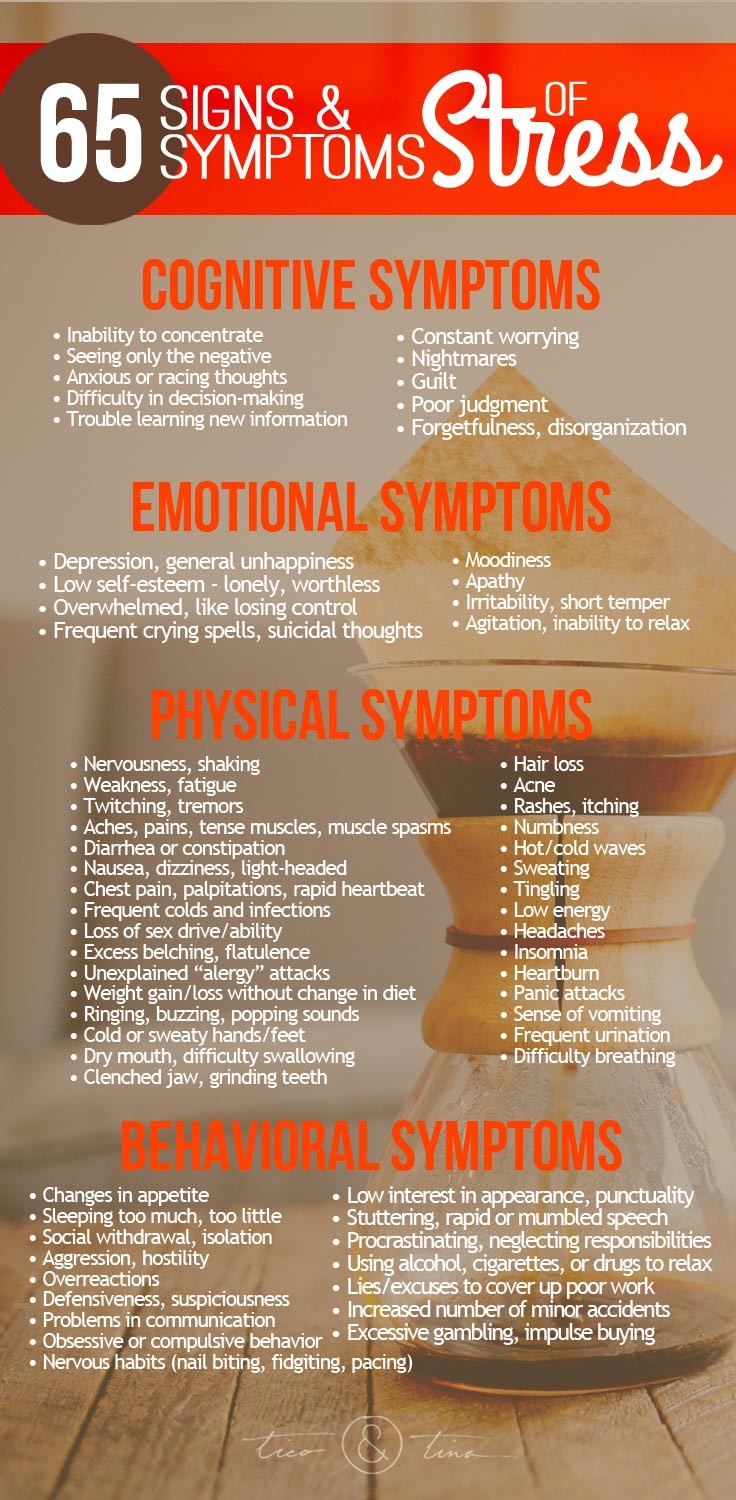
Contents
Physical and Emotional Signs of Stress
Stress can have various effects on the body, affecting multiple systems. Physical signs of stress include cardiovascular, digestive, immune, endocrine, muscular, reproductive, and respiratory issues. Emotional signs of stress encompass irritability, anxiety, depression, feeling overwhelmed or unmotivated, and loneliness.
Stress is the body’s natural response to threats, demands, or challenges, resulting in both physical and emotional tension.
Stress affects behavior, mood, and various systems, organs, and tissues throughout the body.
Signs and symptoms of stress
Stress has wide-ranging physical symptoms, impacting different body systems:
Cardiovascular system
Stress triggers the "fight or flight" response, releasing stress hormones like adrenaline, noradrenaline, and cortisol, which increase heart rate. It also dilates blood vessels, elevating blood pressure and the risk of heart attack or stroke.
Digestive system
Stress prompts the liver to produce more blood sugar, potentially leading to an increased risk of type 2 diabetes. It can also cause digestive issues such as upset stomach, heartburn, and changes in bowel movements.
Immune system
Chronic stress weakens the immune system, making individuals more susceptible to infections and illnesses.
Endocrine system
When the brain perceives a threat, it triggers the hypothalamic-pituitary-adrenal (HPA) axis, increasing production of stress hormones, including cortisol.
Muscular system
Stress often leads to muscle tension, and chronic stress can cause prolonged muscle tension and discomfort.
Reproductive system
Acute and chronic stress can affect reproductive health in men and women, causing hormonal imbalances, sexual dysfunction, and pregnancy-related complications.
Respiratory system
In response to stress, breathing may become faster as the body attempts to distribute oxygen-rich blood. This can be particularly challenging for individuals with existing respiratory conditions like asthma.
Emotional signs of stress
Chronic stress can have a significant impact on emotional well-being, giving rise to irritability, anxiety, depression, feelings of being overwhelmed or unmotivated, and a sense of loneliness or isolation.
Causes of stress
Situations and events that cause stress are known as stressors, which can be external or internal factors.
Common external stressors include work or school responsibilities, relationships, finances, living arrangements, and schedules.
Common internal stressors include inflexible thinking, negative self-talk, low self-esteem, pessimism, perfectionism, and a desire for control.
It’s important to note that stressors vary among individuals, with what may be stressful for one person being enjoyable or exhilarating for another.
When to see the doctor for stress
If you’re struggling to manage stress on your own, reach out to your doctor for guidance and support. Seeking medical help is especially important if stress is affecting your physical or mental health, leading to suicidal thoughts or increased substance use.
Diagnosis for stress
Diagnosing stress involves assessing the disruption of normal homeostasis and analyzing the activity of the hypothalamic-pituitary-adrenal (HPA) axis and the sympathoadrenal system (SAS). Diagnostic tools may include questionnaires, biochemical measures, and physiologic techniques.
Treatments for stress
There are various treatment options for stress:
Make lifestyle changes
Prioritize exercise, maintain a balanced diet, and reduce sugar intake. Establish a manageable exercise routine that suits your schedule and fitness level.
Eliminate stress sources
If your job is causing stress, discuss your workload with your supervisor. Learn to say "no" when your schedule is already full. Address difficult people in your life through open conversations or by minimizing contact.
Integrative treatments can also aid stress management:
Meditation and mindfulness
Meditation helps achieve relaxation by focusing on breathing and present-moment awareness. Mindfulness-based stress reduction (MBSR) programs use meditation principles to raise awareness of how negative thoughts impact physical well-being. MBSR offers additional benefits like improved memory, focus, resilience, and mood stability.
Cognitive behavioral therapy
Cognitive behavioral therapy (CBT) aims to identify and challenge negative or intrusive thoughts. It can be as effective as other therapies or medications in treating stress, anxiety, and depression.
Acupuncture
Acupuncture, a traditional Chinese practice, stimulates the immune and nervous systems to reduce the stress response in the body.
Massage
Massage is effective for stress-related disorders, providing relief from anxiety, insomnia, muscle tension, and cortisol levels. It increases the production of endorphins, serotonin, and dopamine.
Sources:
– The American Institute of Stress: "Stress Effects."
– American Psychological Association: "Stress effects on the body."
– John Hopkins Medicine: "Stress Busters: 4 Integrative Treatments."
– Help Guide: "Stress Symptoms, Signs, and Causes."
– Metabolism: "Diagnosis of Stress."
– The National Institute of Mental Health Information Resource Center: "5 Things You Should Know About Stress."
– NHS Inform: "Struggling with stress?"
– Yale Medicine: "Stress, Anxiety, or Depression? Treatment Starts With the Right Diagnosis."


